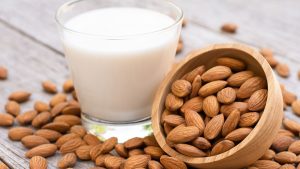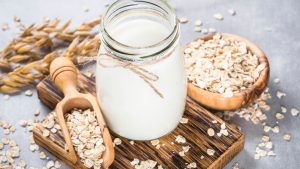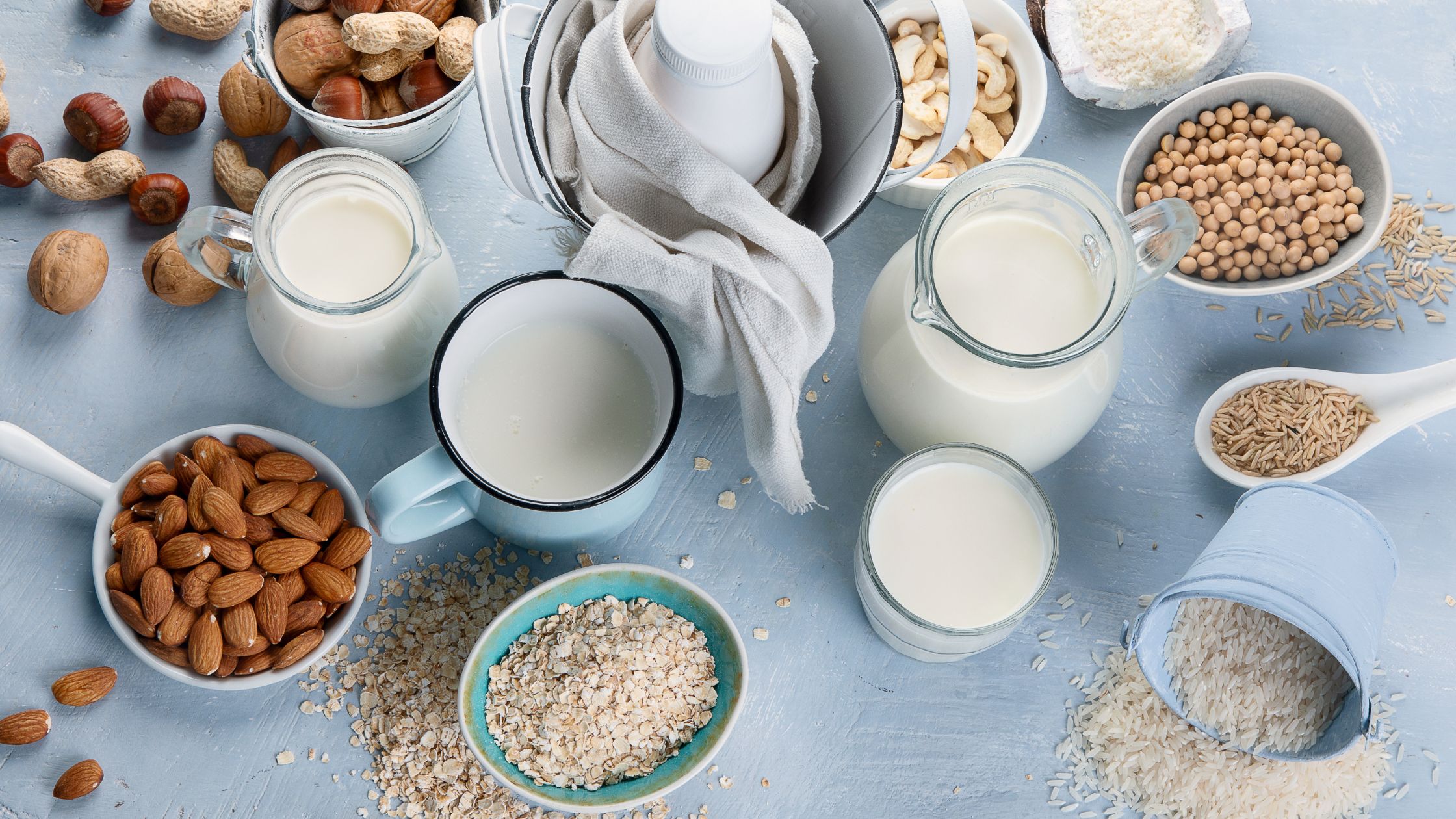As plant-based milk increase in popularity, it is important to understand how they impact your intake of essential minerals, micronutrients, and more.
Finding the best plant-based milk to meet your needs can be a drippy endeavour. Yet, with the help of this guide to plant-based milk, you will no longer cry over spilt milk facts. Whether you want to choose a plant-based milk because you need a lactose-free, dairy-free option, or for health, sustainability, or animal ethics reasons, come discover the healthiest plant-based milk for your needs. Plus, here are some surprising facts you’ll want to know before pouring your next glass of milk.
10 Facts About Plant-Based Milk You’ll Want to Know:
- Plant-based milk are non-dairy beverages made from nuts, seeds, legumes, grains, or coconut.
- Requiring less land and water to produce, some are reaching for plant-based milk as a healthier alternative for the planet.
- Vegans consuming some types of plant-based milk may need to look for alternative vitamin B12 sources.
- Fortification can help some plant-based milk achieve equivalent amounts of calcium as cow’s milk.
- Micronutrients in cow’s milk may not be present in your favourite plant-based milk – reach for whole foods to fill nutritional gaps.
- Seeking plant-based milk fortified with vitamin D may be helpful to Canadians, a northern population at risk of vitamin D deficiency.
- Protein content in plant-based milk varies among types and brands, with soy, almond, and oat typically offering more.
- The plant-based milk highest in sugars is oat milk or any sweetened milk.
- Sometimes the term “mylk” is used to describe plant-based milk.
- Barista plant-based milk contain added oils to help them froth.
What is Plant-Based Milk?
With the exception of coconut milk, most plant-based milk are made from a water-based plant extract of these plant ingredients. The creamy mouthfeel makes them an ideal alternative for those seeking a substitute for milk in their diet.
Is Plant-Based Milk Healthy?
Plant-based milk may be a healthy choice for some lifestyles. Low in saturated fat and lactose-free, plant-based milk are ideal for some groups of people, including vegans. Protein contents vary amongst plant-based milk, with soy milk commonly being the highest in protein, with some containing up to 10g per serving. When fortified with calcium, vitamin B12, and other nutrients, plant-based milk can offer health benefits. However, plant-based milk can vary greatly in their nutrient profiles based on how well they are fortified. Vegans should read the label of their preferred plant-based milk to determine if alternative sources of vitamin B12 are needed in their diet, as this population can struggle to find sufficient sources of this vital nutrient.
Why Choose Plant-Based Milk
Some of the reasons people choose plant-based milk include:
- Dairy-free
- Vegan
- Lactose-free
- Low in saturated fat & calories
- Source of some nutrients
- Animal-friendly
- Sustainable
Is Plant-Based Milk Healthier than Dairy Milk?
Dairy-free, plant-based milk are lactose-free and analysis shows they do not contain high amounts of saturated fat or calories, as such researchers argue they may be a healthier choice than cow’s milk for some. According to researchers, soy milk offers the highest protein of plant-based milk, while almond and oat were close behind. Fortification with calcium can help some plant-based milk achieve levels equivalent to that of cow’s milk. If your favourite plant-based milk is low in calcium, eat more cruciferous vegetables, almonds, peas, beans, and lentils. Of note, Western diets use cow’s milk as a source of some micronutrients (selenium, magnesium, zinc, potassium). These nutrients are found in plant-based milk in varying amounts. A holistic eating plan that’s rich in whole foods (bananas, pumpkin, broccoli, seeds, whole grains, lentils, and certain nuts) can support your micronutrient requirements.
What Are the Disadvantages of Plant-Based Milk?
With Western diets relying heavily upon milk to contribute substantial levels of vitamin D, a shift to plant-based milk may mean you need to supplement with vitamin D if your preferred alternative beverage is not sufficiently fortified: analysis of plant-based milk on the market by researchers found that almost 60% do not contain sufficient fortification of vitamin D.
Guide to Plant-Based Milk
Not all plant-based milk are created equal. Here’s a quick guide to plant-based milk to help you find the best fit for your health:
-
Almond Milk
 Made with almonds and water, almond milk is a plant-based beverage that has been consumed in the Mediterranean for many years. A lactose-free milk alternative with no saturated fat, almond milk is attractive to the lactose intolerant and those with heart health concerns. Opt for unsweetened almond milk to reduce added sugar intake. Fortified almond milk may offer more of the needed calcium, vitamin D, and vitamin B12. Almond milk vary in protein content from brand to brand. Shake well before use to redistribute nutrients in the watery solution of this beverage. Almond milk is not appropriate for people with tree nut allergies.
Made with almonds and water, almond milk is a plant-based beverage that has been consumed in the Mediterranean for many years. A lactose-free milk alternative with no saturated fat, almond milk is attractive to the lactose intolerant and those with heart health concerns. Opt for unsweetened almond milk to reduce added sugar intake. Fortified almond milk may offer more of the needed calcium, vitamin D, and vitamin B12. Almond milk vary in protein content from brand to brand. Shake well before use to redistribute nutrients in the watery solution of this beverage. Almond milk is not appropriate for people with tree nut allergies.
-
Cashew Milk
Similar in basic nutrients to almond milk, cashew milk has a slightly different flavour and mouth feel. Try a variety of unsweetened nut milk and brands, until you find the one you like best.
-
Coconut Milk
Creamy delicious coconut milk is a popular plant-based milk due to its beloved flavour. However, it’s worth noting it is higher in saturated fat and commonly lower in calcium than other plant-based milk.
-
Oat Milk
 With a creamy texture and flavour that suits lattes and teas, oat milk is adored by many plant-based milk drinkers. Oat milk tends to contain more sugar than other plant-based milk. Sweetened oat milk can contain particularly high amounts of added sugar. Oats are a source of beta-glucan known to help naturally lower cholesterol and other health-promoting fibers – but, read the labels as some oat milk may not contain much fiber. With 4g of protein per cup, oat milk offers about half of what is found in cow’s milk.
With a creamy texture and flavour that suits lattes and teas, oat milk is adored by many plant-based milk drinkers. Oat milk tends to contain more sugar than other plant-based milk. Sweetened oat milk can contain particularly high amounts of added sugar. Oats are a source of beta-glucan known to help naturally lower cholesterol and other health-promoting fibers – but, read the labels as some oat milk may not contain much fiber. With 4g of protein per cup, oat milk offers about half of what is found in cow’s milk.
-
Rice Milk
Rice milk is a plant-based milk some with allergy concerns reach for. It is low in protein and has a relatively high glycemic index. Not a significant source of calcium, some rice milk are enriched – read your labels to discover what’s in your rice milk of choice.
-
Soy Milk
Higher in protein than most plant-based milk, soy milk is a popular choice. Made with soybeans and water, soy milk is sometimes made with thickeners or stabilizers, such as carrageenan. Many brands have switched out carrageenan for alternative ingredients due to consumer demand after studies raised safety concerns about semi-refined carrageenan.
What is the Healthiest Plant-Based Milk?
You are unique and so are your body’s needs. With a variety of plant-based milk available in Canada, there are many options to meet your needs. For optimal results, read the label of your preferred choice to ensure the nutrients you desire are present. Nutritional facts vary amongst types of plant-based milk, as well as between brands.
References:
International analysis of the nutritional content and a review of health benefits of non-dairy plant-based beverages. Nutrients 2021; 13930; 842.
Nutritional assessment of plant-based beverages in comparison to bovine milk. Front Nutr 2022 Aug 8.
How well do plant-based alternatives fare nutritionally compared to cow’s milk? J Food Sci Technol 2018 Jan; 55(1): 10-20.
Plant-based milk substitutes: bioactive compounds, conventional and novel processes, bioavailability studies and health effects. J Funct Foods 2020 July, 70: 103975.
A comparative assessment of the nutritional composition of dairy and plant-based dairy alternatives available for sale in the UK and the implications for consumers’ dietary intakes. Food Res Intern 2021 Oct; 148: 110586.
Experimental evaluation of food-grade semi-refined carrageenan toxicity. Int J Mol Sci 2021 Oct 16; 22(20): 11178.
Contributed by Allison Tannis, R.H.N.
